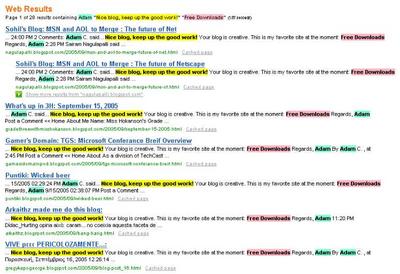Stay around long enough on the World Wide Web and you will get quite a collection of unsolicited emails asking to trade links.
Trading B2B and B2C marketing links is not necessarily good or bad.
I have certain criteria that I follow anytime I place a link in any webpage or ask for a link back to a specific page on a website.
Marketing Question I Ask:"What am I attempting to accomplish by placing a specific
marketing link right here?"
To really answer that question involves more of an online marketing strategy rather than some people placing a search engine strategy first. Typically 90% of all reciprocal requests for links are nothing more than a path to a (
link farm). Link Farms are nothing more than a page with a whole bunch of keyword links all found in one place. Many directories are turning into this.
The webmaster on a farm site is attempting to increase that particular page exposure in the natural search results in order to try to move up the placement in the keywords searches. Most times these types of pages have very little or no original content with only tons of online advertising and of course the links themselves. Other times an unethical webmaster will copy large chunks of text body from another site and not follow proper writing syntax by not block quoting large blocks of body text or properly placing quotes with-in the text. Some have even taken to outright plagiarism and complete copyright infringement by not giving any credits to the original articles while attempting to pass them off as their own.
Marketing Strategy LinkingThe beauty of writing on the Web is how one idea can lead to two or more adjoining concepts. Similar to the term side bar, when attorneys are adjudicating their case in a court of law and clarification should be given by a judge, Or, when a side note is necessary for a better explanation of a written article, the internal and external links on a web page can provide substantially more informative information related to concepts within the main text. Not only is this type of linking natural but it really helps the reader in their understanding. The choice is theirs on whether they click or not.
Marketing on the web provides a means to let your products or services shine on the Internet. By providing relevant and informative online information internal links will give a reader more information about the products or services offered. Readers will most assuredly appreciate clarification on various topics. By providing an external link that may have even more detailed or technical information and tying it to the article on your site can help even more in marketing your company. People will remember where excellent info can be found, and readers (potential customers) are more likely to return in the future.
Back on the FarmWhat many Webmasters are failing to realize is search engine algorithms are looking more and more unfavorable to both the link farm concept as well as the copying of intellectual property in the form of website content. Algorithms are evolving exponentially in what can be cross referenced, compared, and evaluated for content, links, grammar style, syntax, context, language usage, idioms, particular usages of special key characters and even mis<>spellings give indications of original content. B2B and B2C reciprocal linking foolish Email requests based on an assumption that the search algorithms are going to continue to move a webpage up in the natural results when it is nothing more than a hollow page is foolish indeed.
Proper Usage of HyperLinksWhile much of this article is given to the side of the foolish email requests there is much to be said for doing it properly. The Web after all is about Free links. Think of the entire Internet as one Great Big Website. This Great Big Website is composed of many different pages including: Search Engines, Directories, Topical Sites i.e. (sports, news, medicine), And B2B, B2C, & C2C Websites. Navigation on the Internet is through hyperlinks. In fact your browser becomes both an extension of the Web in the form of bookmarks or favorites plus a tool for navigation through the Net.
Most websites are composed of some sort of central theme or themes. Entrance to a sub topic on a site often occurs through search. Providing a logical hypertext linking structure enables readers to follow their thoughts. If a hypertext link takes a reader to another logical site then a handshake has occurred. Everyone is happy, your website, theirs, and the online search algorithm. This then provides a vote of confidence to both the readers and the search engines.
To learn more about the internal workings of the Internet, subscribe to our
free online newsletter. Click the "Above All - We Tell" above and below and find out what your business needs to look out for online.
Above All - We Tell It Like It Is, And Do It With Style!
Professional Web Services EBusiness Web Branding
about pwebs.net site
site map
Note: Improper comments, and virus marketing hyperlinks will summarily be removed.











